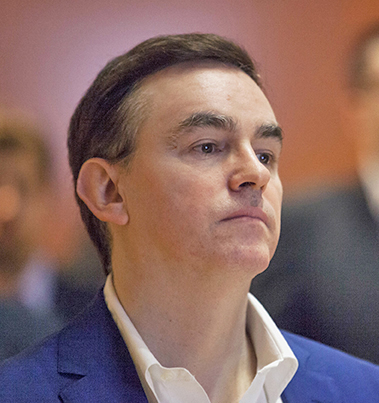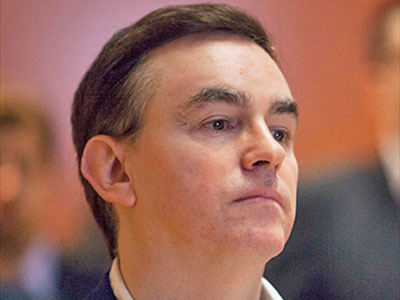
Eddy Travia is CEO and Co-Founder of Coinsilium
Coinsilium is a blockchain investment company with a difference. Since becoming the first company of its type to IPO in 2015 – just one year after being founded – its approach has been to look beyond short-term trends and invest in projects that would be thriving five years on. And taking the longer view is a strategy that seems to be paying off. Over the past four years, Coinsilium has built a portfolio of interests in fast-growing blockchain companies from around the world, including Factom, RSK Labs, Blox and Indorse.
This longer-term view of the fintech space is one of the reasons behind its recent decision to move part of its business to Gibraltar. Fintech.gi met Eddy Travia, CEO and Co-founder of Coinsilium to find out more about the move, his experience of the crypto space and ask him why he’s backing blockchain.
When did you start working within blockchain and crypto?
I started working within the blockchain space back in 2013 in Hong Kong. I founded a startup incubator called Seedcoin, ‘Seed’ as in seed-stage investing and ‘coin’ as at the time the market was all about Bitcoin, ‘blockchain’ was not yet the buzzword back then. I started working with a fellow French engineer and the idea was to support companies and entrepreneurs with the knowledge and infrastructure needed to start working within the bitcoin space. The startups we were supporting were developing wallets, launching exchanges and remittance systems, the overall focus was on transactional applications. The main opportunities at the time were in relation to the financial industry. There was also a thirst from the industry to find out more about this new technology so we decided to put on the first crypto event in Asia in November 2013. Coinsilium was founded shortly after that, in 2014.
Tell me a little about Coinsilium
Coinsilium started as an investment company and, following its IPO, launched an accelerator for blockchain startups in Barcelona in 2016. More recently, in 2017, we started offering advisory services to several companies looking to complete initial coin offerings (ICOs). We are also venture builders and overall I really enjoy working with entrepreneurs, closely following the progress from idea to a growing, we are not passive investors.
What was the motivation for doing the IPO?
While we had started to enjoy some success during 2014, we could see that earning the trust of clients and investors was challenging at times – there was some negative publicity around Bitcoin and some people saw it as an unreliable and immature sector. With the help of our current Chairman, Malcolm Pallé, we decided to start working on an IPO with the aim to list on a recognised stock exchange in London. One of the reasons was to bring legitimacy to the whole sector, not just to us as a company – there were no listed blockchain companies in 2014 which was fuelling the idea that the sector wasn’t reliable. And, of course, one important motivation was the ability to raise funds in order to allow us to keep investing within the field. It was hard work, but we all learnt a great deal from the listing process and our shares (NEX:COIN) have been trading on the NEX exchange in London since December 2015.
What are some of the applications for blockchain as a technology?
Originally the technology was mainly used to transfer value. During our first two years we mostly invested in startups that focused on enabling transfers of value using blockchain technology. But since 2015, as the technology was developing, we saw it moving away from the early transactional applications into more sophisticated applications like smart contracts. Factom, one of our portfolio companies, is active in the sector of data recording and data security and one of their main focus is the mortgage industry. Factom’s solution anchors data on various blockchains offering a proof of existence and certain records, such as compliance checks for example. Factom removes the need for blind trust by providing a precise, immutable and time-stamped audit trail.
What have been the biggest challenges you’ve faced in building a business in this space?
One of the biggest challenges has been the lack of general knowledge about the technology, it was especially challenging in the first three years as we were meeting VCs and professional investors who were not yet familiar with blockchain technology. The whole sector was affected by the bad press around blockchain and crypto currencies following the crypto exchange hacks in the early days. The fact that there were no clear regulations in place also made it hard for investors and entrepreneurs, alike.
Is education around blockchain technology a driver for its adoption?
Absolutely. A lot of people, as soon as they enter this space, certainly in our experience at least, start going to meetups and attending face to face education seminars. We hosted our own Blockchain Tech Lab in London back in 2016 during which we had Sergio Lerner, the Chief Scientist from RSK talking to delegates. Connecting the experts with newcomers to the sector, at the tech and non-tech level is key. Part of the problem is that blockchain is a very abstract concept, it’s hard to grasp within a short time, it does take some commitment on behalf of the learner.
Why the move to Gibraltar?
Our attraction to Gibraltar has been the regulatory work that has been done here and our very good relationship with Joey Garcia, partner at Isolas LLP. When we started out, there was little clarity around the regulatory framework around blockchain, this was one of the challenges for us and for our portfolio companies, having a supporting jurisdiction like Gibraltar is very important. We feel that being here makes our advisory work easier – we’ve actually been recommending Gibraltar as a jurisdiction of choice to many of the companies we advise as well. Gibraltar has embraced the industry and has started working on the Distributed Ledger Technology regulation before the ICO wave. I believe there will be many larger firms and leaders of the blockchain sector moving their businesses to Gibraltar. On a more personal note, this whole area is close to my heart actually. While I’m originally from France, I lived near Málaga in the late 70s and early 80s and attended the French school there. I speak Spanish and am familiar with the area, so being able to be based in this part of the world again is great.
Links:





